Empowering and Enabling People to be Self-Sufficient
 A young Spanish journalist with a successful career and a privileged upbringing came to India in 2003 after being convinced by a travel agent to spend his vacation in the land of infinite variety. The young journalist, Jaume Sanllorente, was unprepared by what he saw and experienced. This was the watershed moment in his life. He was determined to do something to make the world better. Thus began the journey of Mumbai Smiles, a non-profit organisation working with underprivileged communities in Mumbai. His work has brought in recognition, among others, the Telva 2009, Premio Axuda 2007, Premio Cine Solidario Castilla La Mancha, Premio Tierno Galván 2009. He was also awarded the Officer’s Cross of the Order of Civil Merit by H.M. the King of Spain in 2009, and the Golden Cross by the Spanish Association of European Development.
A young Spanish journalist with a successful career and a privileged upbringing came to India in 2003 after being convinced by a travel agent to spend his vacation in the land of infinite variety. The young journalist, Jaume Sanllorente, was unprepared by what he saw and experienced. This was the watershed moment in his life. He was determined to do something to make the world better. Thus began the journey of Mumbai Smiles, a non-profit organisation working with underprivileged communities in Mumbai. His work has brought in recognition, among others, the Telva 2009, Premio Axuda 2007, Premio Cine Solidario Castilla La Mancha, Premio Tierno Galván 2009. He was also awarded the Officer’s Cross of the Order of Civil Merit by H.M. the King of Spain in 2009, and the Golden Cross by the Spanish Association of European Development.
Juame Sanllorente, Founder,Mumbai Smiles shares with Atula Imchen the projects they are focusing on health, education, livelihood and awareness building and how as an agent of change, Mumbai Smiles is helping to channelise resources to the ones who need them the most.
Tell us about yourself, Mumbai Smiles and how did it come into existence?
 I was a journalist in Spain and had a normal life in Barcelona. In 2003, I visited India as a tourist. I was shocked to see the situation and vulnerability of the most underprivileged communities in Mumbai. I could not believe what my eyes were seeing and all this happening in our world and in our century.
I was a journalist in Spain and had a normal life in Barcelona. In 2003, I visited India as a tourist. I was shocked to see the situation and vulnerability of the most underprivileged communities in Mumbai. I could not believe what my eyes were seeing and all this happening in our world and in our century.
I decided to create Mumbai Smiles. I started by supporting a small orphanage in the northern suburbs. I sold my apartment in Barcelona, left my job as a journalist and moved to Mumbai, starting a peaceful fight against poverty that is still going on today, 13 years later.
I am sure that you must have visited many places around the world and saw the needs of the underprivileged living in these countries. So why Mumbai, why India? Are the needs here much greater or serious than the ones compared in other countries?
Yes, I have visited a lot of countries and cities around the world, including places in Africa. But I have never seen the “All countries have good and bad things and it is our duty to say what we think is wrong and act consequently. What entitles me to say all this is the simple fact of being a human, a ‘world colleague’ of other humans. I see suffering every day here in Mumbai; and all of us have the same rights” cruelty, atrocity and vulnerability of citizens which I saw in India. Never! I think that one of the crucial factors is the fact that India is not a poor country. How can it have the biggest percentage of poor citizens in the world then? The impassiveness of the rest of the citizens towards poverty and lack of human rights is what makes it, in my opinion, a very serious issue.
 Also, I have never seen this amount of inconsistency of the authorities, so far away from the reality of the accomplishment of certain duties that the Government should accomplish. For instance, how can it be possible that a country that ratified, so many years ago, the most basic rights (Education among them) in the United Nations did not have any act for Right to Education until 2009? Incredible!
Also, I have never seen this amount of inconsistency of the authorities, so far away from the reality of the accomplishment of certain duties that the Government should accomplish. For instance, how can it be possible that a country that ratified, so many years ago, the most basic rights (Education among them) in the United Nations did not have any act for Right to Education until 2009? Incredible!
A lot of people I have met over the years blame politicians and corruption for a lot of issues, but can we say that it is only the politicians who are corrupt in a country where only one percent of the entire population pay taxes? Can a citizen who pays money under the table to an official to speed up the bureaucracy processes blame politicians for corruption? And I quote Mahatma Gandhi, “Before asking for your rights, accomplish your obligations.”
And I am not saying this because I feel that being a European entitles me to say so. Not at all! Europe has a lot of issues to improve and it is very meaningless sometimes! All countries have good and bad things and it is our duty to say what we think is wrong and act consequently. What entitles me to say all this is the simple fact of being a human, a ‘world colleague’ of other humans. I see suffering every day here in Mumbai; and all of us have the same rights.
Which projects did you start with under Mumbai Smiles? What are the other focus areas?
Education, health and livelihood. We deeply believe that education is the main key that will allow the most underprivileged communities in this country to open the doors of their own freedom.
 We work with the communities offering a holistic approach; where health, teaching them their rights, etc are also taken into consideration. Often times, problems are universal and we need to work on the entire situation.
We work with the communities offering a holistic approach; where health, teaching them their rights, etc are also taken into consideration. Often times, problems are universal and we need to work on the entire situation.
“Indeed, helping the underprivileged face the world with confidence means bringing more empowered citizens to the world we live in, to our world. So what is good for a underprivileged citizen is also good for the rest of human beings in his/her country and, consequently, in the world”
Over the years, we have also focussed on women and the girl child. It is shocking to know the numbers reflecting the terrible situation of women in India.
India’s Right to Education Act which was enacted in August 2009 was a significant step in ensuring free and fair education to children between 6-14 years. But it did miss very important and crucial age groups that also require attention. Tell us about your mission in the area of education in the different age groups.
Correct. And I must say that a lot of NGOs before us had been fighting and struggling to make it possible. It is a shame that a country that ratified international Human Rights pacts and conventions did not have any Act regarding mandatory and free education. But, even though it was a great step, there is still a long path to walk.
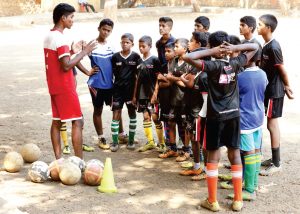 First of all, ages below 6 and above 14 are completely unprotected, and this is a serious issue. We all know how frequent it is that children below the age of six are forced to work under extreme conditions, or is taken by a mafia, or even is sold by their own parents. How can you expect them to attend school at six if you have exposed them to such dangers before then?
First of all, ages below 6 and above 14 are completely unprotected, and this is a serious issue. We all know how frequent it is that children below the age of six are forced to work under extreme conditions, or is taken by a mafia, or even is sold by their own parents. How can you expect them to attend school at six if you have exposed them to such dangers before then?
Secondly, is the quality of public education in India what it should be? As far as I know, it is not. I am not afraid to say so. Would a parent with a good professional background enrol his child in a public school? If the answer is no, it means that something is wrong. Public services (education being one of the most important) should reach excellence; it should be the best. If it is not-and I believe that 90 percent of the readers of this interview would agree-it means that India is not investing enough (not only in financial terms, but also in setting the right priorities).
When will this country realise that good investment in quality education end up being visible in good workers for infrastructures, good speed of services, good speed in bureaucracy, etc? Most of the problems India is facing today are because not enough has been invested in education. A ‘peon’ as he is called in India, should have the same basic education as a lawyer. Until we do not understand this completely, there will not be any real development. A country cannot be considered a developed country if it does not understand the concept of equality as it should be understood.
What has been the result of your untiring work in this area? How many school-going children have benefitted from your endeavour?
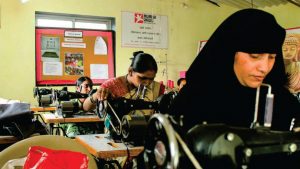 During the last 13 years, we have impacted the lives of more than 7000 citizens of the most underprivileged communities in the slum areas of Mumbai and its surroundings. What gives me joy is seeing the numbers of lives that have been changed as a result of the work we have been doing. Take for example a young boy who was begging in the local train stations. He is now the Second-in-Command Chef in one of the best hotels in Mumbai; or how a girl that was abused and forced to work in a brothel in Kamathipura is today a successful lawyer in a good firm; all because of Mumbai Smiles’ efforts over the years. The fruit of hard work is paying off and every hurdle and challenge we faced is all worth it.
During the last 13 years, we have impacted the lives of more than 7000 citizens of the most underprivileged communities in the slum areas of Mumbai and its surroundings. What gives me joy is seeing the numbers of lives that have been changed as a result of the work we have been doing. Take for example a young boy who was begging in the local train stations. He is now the Second-in-Command Chef in one of the best hotels in Mumbai; or how a girl that was abused and forced to work in a brothel in Kamathipura is today a successful lawyer in a good firm; all because of Mumbai Smiles’ efforts over the years. The fruit of hard work is paying off and every hurdle and challenge we faced is all worth it.
“We have undertaken many campaigns in the last few years, nationally (in India)and internationally (in Spain and other countries). More than sensitising about Mumbai Smiles, we try to go beyond that and sensitise about the vulnerability of many communities in this city”
Share with us the work you are doing among leprosy patients in Mumbai.
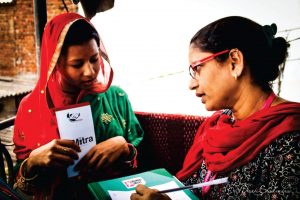 We started working very closely with an organisation called Bombay Leprosy Project, where we learnt a lot about this illness and the wrong notion that the international community has in thinking that this disease has been eradicated. India still has many cases of leprosy as do a lot of countries. But one of the big issues of this disease is the stigma it carries with it for the ones still affected by it and for those who have been cured of it (with visible marks of the illness) to go back to a completely normal life and work.
We started working very closely with an organisation called Bombay Leprosy Project, where we learnt a lot about this illness and the wrong notion that the international community has in thinking that this disease has been eradicated. India still has many cases of leprosy as do a lot of countries. But one of the big issues of this disease is the stigma it carries with it for the ones still affected by it and for those who have been cured of it (with visible marks of the illness) to go back to a completely normal life and work.
Over the last few years, we did not observe any new case in the communities we work with, which is a good sign, for sure; but we should not relax in our attempt to identify new cases and reaching out to them.
Empowering the underprivileged is something that has proven to be a big determining factor in making them independent, face the world with confidence and looking forward to a better future. What are the sustainable livelihood approaches that Mumbai Smiles is adopting?
Indeed, helping the underprivileged face the world with confidence means bringing more empowered citizens to the world we live in, to our world. So what is good for an underprivileged citizen is also good for the rest of human beings in his/her country and, consequently, in the world.
It is still very early to give details about it, but we are now developing a new project based on the creation of a social enterprise completely self-sufficient for women in the communities we work with.
What are the awareness campaigns you undertake to sensitise people and organisations at large about Mumbai Smiles?
We have undertaken many campaigns in the last few years, nationally (in India) and internationally (in Spain and other countries). More than sensitising about Mumbai Smiles, we try to go beyond that and sensitise about the vulnerability of many communities in this city.
Since we receive a lot of international visitors who come to see with their own eyes the outcome of our work, we try to sensitise them about being respectful to the communities and the cultural differences that exists.
How has your background as a journalist and continuing networking with the media helped in raising awareness about the work you are doing through Mumbai Smiles?
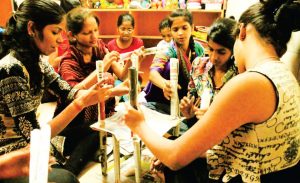 It has helped a lot, and I take it as a duty, as a responsibility. Having a public projection, especially in Europe because of the success of my first book, “Bombay Smiles: The Trip That Changed My Life”, gives me the opportunity of having a platform that can be useful in order to raise awareness about the needs and the vulnerability of a lot of citizens in the slum areas of Mumbai. Before taking any step as a journalist, writer or public figure, I always ask myself: “How will it impact the people I am devoted to?” Because I have chosen to follow this path of serving the poorest of the poor citizens of Mumbai, I want my professional actions as a journalist and writer to be converted into improvements for the communities we work with.
It has helped a lot, and I take it as a duty, as a responsibility. Having a public projection, especially in Europe because of the success of my first book, “Bombay Smiles: The Trip That Changed My Life”, gives me the opportunity of having a platform that can be useful in order to raise awareness about the needs and the vulnerability of a lot of citizens in the slum areas of Mumbai. Before taking any step as a journalist, writer or public figure, I always ask myself: “How will it impact the people I am devoted to?” Because I have chosen to follow this path of serving the poorest of the poor citizens of Mumbai, I want my professional actions as a journalist and writer to be converted into improvements for the communities we work with.
My job as Executive President of Mumbai Smiles includes the enormous task of communicating to anyone who is willing to listen to me about the situation of the most deprived and underprivileged ones in this city. I deeply feel that my job should be a combination of leadership, management, constant contact with the field and the communities and, of course, communication.
What would you say is your biggest achievement? Where do you see yourselves in the next three to five years?
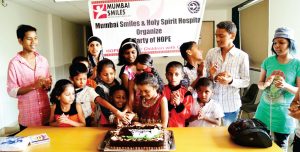 Let me reiterate: the biggest achievement of Mumbai Smiles and the communities, because every achievement is the result of teamwork, is something beyond numbers and impact assessment. Witnessing first-hand amazing individuals who have been able to use the tools we provided in are markable way, and have progressed to become self-sufficient and free citizens is a validation of the sacrifices and hard work that has been invested. This is the biggest achievement: to observe, day after day, the freedom that Mumbai Smiles has been able to give to amazing and extraordinary citizens I am blessed to be working with.
Let me reiterate: the biggest achievement of Mumbai Smiles and the communities, because every achievement is the result of teamwork, is something beyond numbers and impact assessment. Witnessing first-hand amazing individuals who have been able to use the tools we provided in are markable way, and have progressed to become self-sufficient and free citizens is a validation of the sacrifices and hard work that has been invested. This is the biggest achievement: to observe, day after day, the freedom that Mumbai Smiles has been able to give to amazing and extraordinary citizens I am blessed to be working with.

